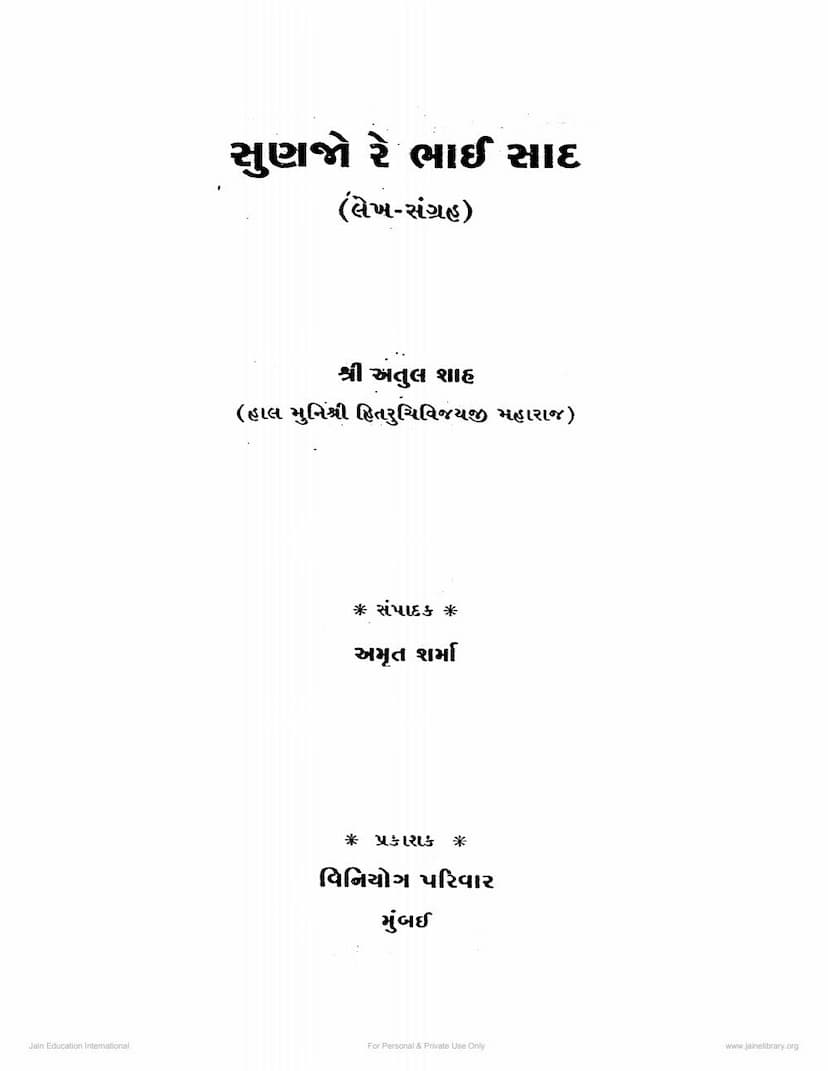Sunjo Re Bhai Sad
Added to library: September 2, 2025

Summary
The book "Sunjo re Bhai Sad" (Listen, Brother, to the Call) is a collection of essays by Atul Shah, who later became Muni Hitaruchi Vijayaji. The book, published by Viniyog Parivar, is a compilation of Shah's writings that reflects his deep concern for Indian culture, traditional values, and the environment.
The editor, Amrut Sharma, highlights the book's purpose as an attempt to share cherished thoughts and ideas. The publisher allows for the reproduction of any article from the book without prior permission, encouraging the spread of these ideas.
The core themes explored in the book revolve around the negative impacts of Western influence, modernity, science, and industrialization on Indian society and its traditional way of life. The author argues that these advancements have led to a decline in morality, rise in unemployment, illness, poverty, and inflation.
Key Arguments and Concerns Raised in the Book:
- Critique of Modernization and Westernization: The book heavily criticizes the adoption of Western lifestyles, education systems, and ideologies, arguing they have eroded India's rich cultural heritage and moral fabric. The author contrasts this with the wisdom of ancient Indian traditions and philosophies.
- Environmental Degradation: A significant portion of the book is dedicated to environmental concerns.
- Meat Consumption: The author strongly advocates for vegetarianism, citing the environmental damage caused by livestock farming for meat production. He links meat consumption to deforestation, resource depletion, and pollution.
- Fertilizers and Pesticides: The book decries the use of chemical fertilizers and pesticides, labeling them "slow poison" that degrades soil fertility, contaminates food and water, and harms human health.
- Water Management: The author questions large-scale dam projects like the Narmada Dam, arguing they disrupt natural water cycles, lead to environmental destruction, and displace communities, while often failing to deliver on their promised benefits of water for irrigation and drinking. He promotes traditional water conservation methods.
- Biodiversity Loss: The book laments the loss of indigenous crop varieties and animal breeds due to the promotion of hybrid seeds and cross-breeding with foreign species, arguing this leads to a fragile and less resilient agricultural system.
- Critique of Consumerism and Industrialization: The author criticizes the promotion of consumerist culture and large-scale mechanized industries, which he believes lead to unemployment, poverty, and environmental pollution. He advocates for the revival of rural industries and traditional crafts.
- Health and Traditional Practices: The book emphasizes the superiority of traditional Indian practices, including Ayurveda and natural food production, over modern, chemically-laden alternatives. It warns against processed foods, "baby food," and the widespread use of chemical additives in food products.
- Social and Economic Issues: The author touches upon issues like the decline of traditional values in family life, the negative impact of modern education, and the manipulative nature of politics and media. He calls for a return to community-based living and self-sufficiency.
- Critique of Government Policies: The book criticizes government policies that favor industrialization, chemical agriculture, and the promotion of Western-style development at the expense of traditional livelihoods and the environment.
Specific Examples and Concerns:
- The book discusses the impact of "Operation Flood" and the role of Dr. Verghese Kurien in promoting dairy farming, raising concerns about the quality and ethical implications of processed dairy products and animal feed.
- It highlights the detrimental effects of chemical fertilizers and pesticides on soil and human health, citing specific examples of contamination and health issues.
- The author extensively criticizes the Narmada Dam project, questioning its environmental impact and the distribution of its benefits.
- The book addresses the rise of "health food" stores and the promotion of natural products as a counter-movement to the widespread consumption of processed and chemically-treated foods.
- It argues for the revival of bullock-driven oil mills and traditional farming methods over mechanized industrial processes.
- The author also discusses the ethical concerns surrounding poultry farming and the treatment of animals in the industry.
- The book includes essays on the importance of traditional ethical texts like Manusmriti and the Bhagavad Gita in guiding societal conduct.
- The author expresses concern over the loss of indigenous plant and animal genetic resources and the lack of public awareness and action to protect them.
In essence, "Sunjo re Bhai Sad" is a passionate plea for a return to the roots of Indian culture, advocating for a more sustainable, ethical, and community-oriented way of life, challenging the prevailing notions of progress and development.